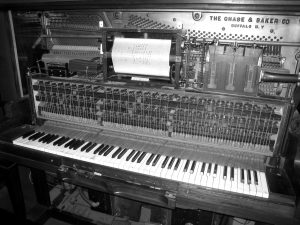 Four weeks ago I wrote about three well-known businesses that suffered by not adapting to a changing market and disruptive approaches and technologies.
Four weeks ago I wrote about three well-known businesses that suffered by not adapting to a changing market and disruptive approaches and technologies.
Since then I travelled to England, and as usual, people were very surprised to hear stories about Japan, a country they perceive as technologically advanced. They’re amazed when I tell them people still use the fax machine, that Japan is still very much a cash-loving society and you can’t pay for a pint of beer in the pub with your Apple Watch or a contactless card.
The trains run on time, I tell them, and the toilet technology is wonderful.
According to statista.com, 38,710 pianos were sold in Japan in 2017.
In a vox pop survey of children at our head school in 2018, studying the piano was most popular after-school activity.
How many concert or professional pianists do you know?
In 2017, Yamaha Music Foundation had over 3,300 schools in Japan teaching approximately 390,000 students, including 280,000 children.* Shane English currently has approximately 23,000 students at the 210 schools listed on their website.
Statistics and logic would dictate that parents encourage their children to study the piano for the love of it, for their own parental aspirations or as part of a well-rounded, social and artistic education, rather than for them to take it up as a professional.
I wonder how many professional pianists or piano teachers are worried about being replaced by technology?
As it happens, the self-playing piano, the pianola, has been around since 1876. This was largely replaced by the phonograph and then other music players. Today the Yamaha Electone can play a full band automatically and we all carry around tens of thousands of songs in our pockets.
Technology is great. Voice in, voice out and AI translation already exist, but everybody loves a chat as much as, if not more than, playing an instrument or listening to a performer.
We can already take AI piano lessons online.
There’s no doubt one day the perfect app that works out what English you need to study and how best and most enjoyably to study it, and is provided to you at no cost, will be released.
For now, though, perhaps there is not so much we need to be concerned about from technology other than as a support to lessons we provide viva voce.
We’ll look at actual stated reasons why parents send their children to English school and what else they do in coming posts.
*Edited on April 6th, 2019. Updated from 460,000 students at Yamaha Music Schools in 2012.
